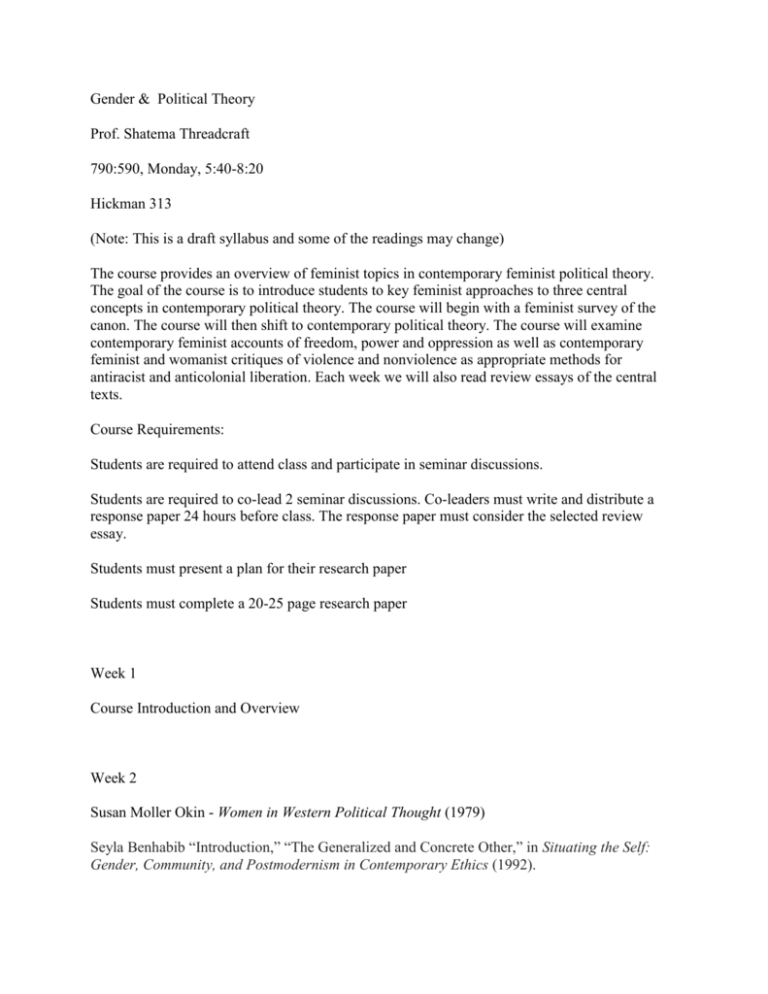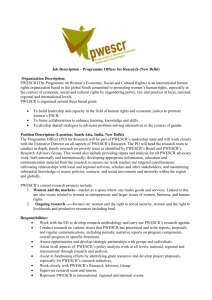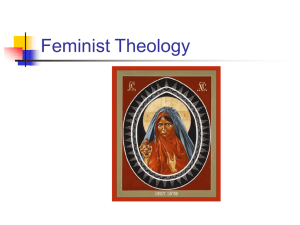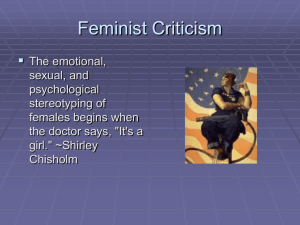790:590
advertisement

Gender & Political Theory Prof. Shatema Threadcraft 790:590, Monday, 5:40-8:20 Hickman 313 (Note: This is a draft syllabus and some of the readings may change) The course provides an overview of feminist topics in contemporary feminist political theory. The goal of the course is to introduce students to key feminist approaches to three central concepts in contemporary political theory. The course will begin with a feminist survey of the canon. The course will then shift to contemporary political theory. The course will examine contemporary feminist accounts of freedom, power and oppression as well as contemporary feminist and womanist critiques of violence and nonviolence as appropriate methods for antiracist and anticolonial liberation. Each week we will also read review essays of the central texts. Course Requirements: Students are required to attend class and participate in seminar discussions. Students are required to co-lead 2 seminar discussions. Co-leaders must write and distribute a response paper 24 hours before class. The response paper must consider the selected review essay. Students must present a plan for their research paper Students must complete a 20-25 page research paper Week 1 Course Introduction and Overview Week 2 Susan Moller Okin - Women in Western Political Thought (1979) Seyla Benhabib “Introduction,” “The Generalized and Concrete Other,” in Situating the Self: Gender, Community, and Postmodernism in Contemporary Ethics (1992). Week 3 Nancy Hirschmann – The Subject of Liberty: Toward a Feminist Theory of Freedom (2003). Isaiah Berlin, “Two Concepts of Liberty” in Liberty: Incorporating Four Essays on Liberty (2002). Week 4 Drucilla Cornell – At the Heart of Freedom: Feminism, Sex and Equality (1998). Week 5 Linda Zerilli – Feminism and the Abyss of Freedom (2005) Bonnie Honig – Feminist Interpretations of Hannah Arendt (1995), selections Habermas, Jurgen, “Hannah Arendt’s Communications Concept of Power,” in Lewis Hinchman and Sandra Hinchman’s Hannah Arendt: Critical Essays (1994). Deitz, Mary, “Hannah Arendt and Feminist Politics,” in Mary Lyndon Shanley and Carole Pateman’s Feminist Interpretations and Political Theory, (1991). Week 6 John Gaventa - Power and Powerlessness: Quiescence and Rebellion in an Appalachian Valley (1980), Selections Amy Allen –, “Foucault on Power: A Theory For Feminists,” in Susan Hekman’s Feminist Interpretations of Michel Foucault (1996). Week 7 M E Hawkesworth – Beyond Oppression: Feminist Theory and Political Strategy (1990). Wendy Brown - States of Injury: Power and Freedom in Late Modernity (1995). Week 8 Carole Pateman and Charles Mills – The Contract and Domination (2007). Saidiya Hartmann, Scenes of Subjection: Terror, Slavery, and Self-Making in NineteenthCentury America (1997). Cheryl Harris, “Whitness as Property,” Harvard Law Review, Vol. 106, No. 8 (1993).Iris Marion Young - "The Five Faces of Oppression" in Justice and the Politics of DifferenceLinda Alcoff, “Feminist Politics and Foucault: The Limits to a Collaboration,” in Ariene Dallery and Charles Scott’s Crises in Continental Philosophy, (1990). Week 9 Bruce Lawrence and Aisha Karim, On Violence: A Reader, (2007),Selections Frantz Fanon, The Wretched of The Earth (2004) Week 10 Aaronette White, “All the Men are Fighting for Freedom, All the Women are Mourning Their Men, But Some of Us Carried Guns: A Raced-Gendered Analysis of Fanon's Psychological Perspectives on War.” Signs, 2007, vol 32, no. 4. Hannah Arendt, On Violence (1970). Week 11 Achille Mbembe, “Necropolitics” Public Culture 2003 Volume 15, Number 1: 11-40 MW Wright, “Necropolitics, Narcopolitics, and Femicide: Gendered Violence on the MexicoU.S. border.” Signs, 2011, vol 36, no. 3. Week 12 Martin Luther King, Stride Toward Freedom: The Montgomery Story,(1958), Why We Can't Wait, (1964) Selections Emilie Townes, A Troubling in My Soul: Womanist Perspectives on Evil and Suffering, (1993), Selections Week 13 In class presentations Week 14 In class presentations








